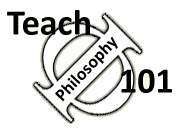Teach Philosophy 101
Free resources for
philosophy teachers!
"One of the most comprehensive, well-researched, and accessible guides for teachers that I have ever seen." James Lang, Chronicle of Higher Education (read full review of TΦ101)
Collaborative Learning
Students can learn a great deal by working in teams. This is a tricky process, since it inevitably raises the problem of what to do about slackers and free riders. Here are some suggestions to get you started.
-
Wikis. Given today's emphasis on collaboration in the workplace, assigning students to do projects outside of class is as important as it is challenging. A technological solution is to set up a "wiki" that allows a defined group of students to collaborate on a document. (Wikipedia is the most famous example, where anyone in the world can edit any entry). Nancy Hancock, from Northern Kentucky University (and President of the American Association of Philosophy Teachers), has a handy guide to getting started.
-
Project-Based Learning: Some researchers suggest that instructors should design courses around a project, rather than around texts. Michael Strawser (University of Central Florida) assigned no texts whatsoever and asked his students to work together over the semester to create their own "introductory textbook in philosophy, complete with reading selections, commentaries, study questions, and glossary" (117). Read his excellent article for details on how he did this. Teaching Philosophy 28.2 (2005): 115-124.
-
"Individual-Centered Collaborative Research." This is an extremely thoughtful and detailed approach to having intro students do collaborative research on a paper, created by Nancy Stanlick at the University of Central Florida. The abstract from Teaching Philosophy captures the idea, but you should study the article: "A method of assigning, assessing, and utilizing individual-centered collaborative research groups enhances student learning, addresses problems of academic integrity such as plagiarism and free-riding in groups, and incorporates the insights of recent literature on the value of collaboration between and among philosophers and scientists. The method stresses the value of collaborative research while maintaining appropriate focus on individual contributions to avoid problems normally encountered in “group work.” Teaching Philosophy, 30.1 (2007):85-110.
Author: John Immerwahr
Update: August 15, 2008
